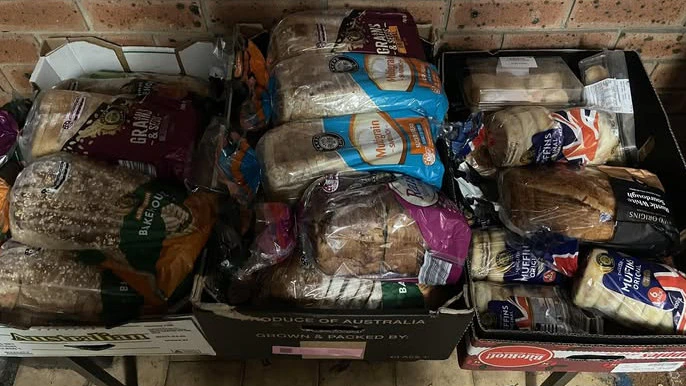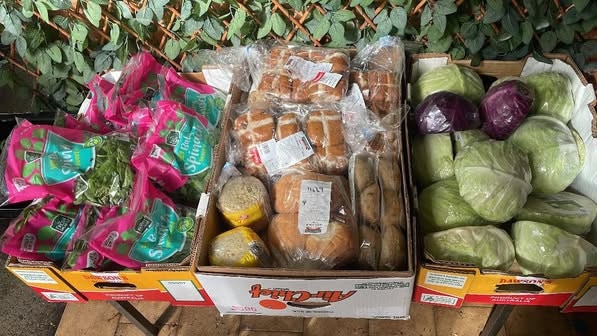A Quiet Protest Against Waste in Sydney’s Inner West
In Sydney’s inner west, a quiet revolution is underway as one man sheds light on a growing issue that many choose to ignore — massive food wastage. Amidst the ongoing cost-of-living crisis, a local resident named Matthew has taken a stand, not for himself, but for his community. His method? Dumpster diving. Yet his purpose goes beyond personal gain — it’s about redistributing food that would otherwise rot in landfills.
Redistribution Over Hoarding
Every week, Matthew collects thousands of dollars worth of unwanted groceries from bins behind major supermarkets. Instead of hoarding his finds, he generously places boxes of salvaged food outside his Enfield home, urging neighbors to “take only what they need.” The act, simple yet profound, paints a stark picture of both waste and community resilience.
Perfectly Good, Yet Thrown Away
Matthew has been stunned by the waste he encounters. Entire cases of soda or jam are tossed simply because one or two containers are damaged. Perfectly good eggs are discarded weeks before their best-before dates. Fresh produce like oranges, still viable, are thrown away if even a single piece in the pack is blemished. It’s a reality that is “mad,” he says — and growing worse.
Rising Security, Rising Hunger
Increased security around supermarket bins has made it harder for Matthew and others to continue their work. “Pretty much everywhere are locking their bins,” he laments. The irony? As bin locks tighten, more families go hungry. And the amount of usable food still being thrown out is “incredible,” he says.
The Bigger Picture: Systemic Waste
This grassroots effort underscores a deeper issue — systemic waste. According to OzHarvest, a leading Australian food rescue organization, the country disposes of hundreds of tonnes of edible food each week. “We currently rescue 300 tonnes of food a week,” a spokesperson revealed. These rescued items are redistributed safely to those in need — a model they hope more supermarkets will adopt.
Corporate Caution and Food Safety
Yet despite best efforts, food waste persists. Supermarkets like Coles and Woolworths warn against dumpster diving, citing significant health and physical risks. A Coles spokesperson stated that any food not donated has been “deemed unsuitable for sale or donation due to being past its use-by date or spoiled.” They caution that loading bays where dumpsters are located pose serious safety hazards.

Progress in Donations, But Challenges Remain
Woolworths echoed the concerns but emphasized their partnership with food rescue groups. In 2024 alone, Woolworths diverted 80% of its food waste from landfills and donated over 36 million meals. Coles, too, donated more than 20,000 tonnes of food, equivalent to 39 million meals — demonstrating a step in the right direction.
Legal Grey Zones and Personal Risk
Still, the act of dumpster diving remains legally murky. NSW Police caution that entering private property or accessing locked bins could constitute trespassing or theft. Matthew knows this all too well — he’s been threatened by security and once faced a potential $1000 council fine.
More Than Survival: A Moral Stand
Despite the risks, he persists, motivated not by necessity, but by a desire to help. “This isn’t about choice – it’s about people being forced into survival mode,” said Jon Owen, CEO of the Wayside Chapel. The organization serves around 1000 people weekly through community meals — no questions asked.
A Broken System in a Land of Plenty
The bigger issue, Owen insists, is not that people are dumpster diving, but that they are forced to in a country where food is thrown out by the tonne. “We need better food rescue programs, rent caps, and increased social housing,” he urged. His call reflects the sentiment of many: waste and need should not coexist so painfully.
Restoring Dignity, One Loaf at a Time
For now, Matthew continues his silent protest. With each bag of apples or loaf of bread saved from the dumpster, he’s not just rescuing food — he’s restoring dignity. As supermarkets debate policy and charities expand their reach, it’s people like Matthew who remind us that waste isn’t just about what we throw away — it’s about who we fail to see.






